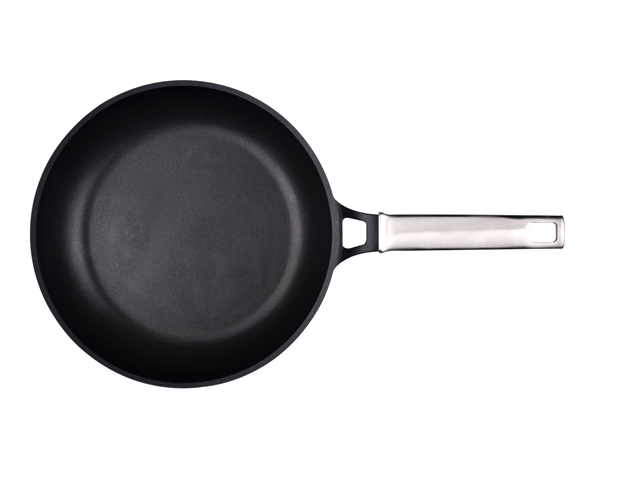Aluminum cookware is an indispensable tool in modern kitchens, prized for its lightweight nature, excellent heat conductivity, and corrosion resistance. However, there are two common types of aluminum cookware on the market: aluminum die cast cookware and aluminum alloy cookware. While they may appear similar at first glance, there are key differences between the two. In the following, we will delve deeper into these distinctions.

Differences Between Aluminum Die-Cast Cookware & Aluminum Alloy Cookware
Material Differences: The most significant difference between aluminum die-cast cookware and aluminum alloy cookware lies in their manufacturing materials. Aluminum die-cast cookware is typically made from aluminum alloys, with aluminum as the primary component. The manufacturing process involves melting aluminum and then injecting it into specific molds under high pressure to create the cookware’s shape. On the other hand, aluminum alloy cookware also contains aluminum but is typically made from a combination of aluminum and other metal alloys such as copper, stainless steel, or other alloys. These additional metal components enhance the cookware’s strength and durability.
Heat Conductivity: While both aluminum die-cast cookware and aluminum alloy cookware are renowned for their excellent heat conductivity, there are subtle differences between them. Aluminum is an outstanding conductor of heat, but in some cases, aluminum alloy cookware can achieve even better heat conductivity through alloying. This means that aluminum alloy cookware can heat up more rapidly and distribute heat more evenly, making it easier to control cooking temperatures and achieve superior cooking results.
Corrosion Resistance: Aluminum alloy cookware is typically more corrosion-resistant than aluminum die-cast cookware. This is because aluminum alloy cookware includes other metal alloys (such as stainless steel) that can better withstand the corrosive effects of acidic or alkaline ingredients. Aluminum die-cast cookware may require more maintenance in this regard to preserve its appearance and performance.
Price: Generally, aluminum die-cast cookware is relatively more affordable, while aluminum alloy cookware tends to be more expensive. The manufacturing process for aluminum alloy cookware involves more engineering and material costs, contributing to the higher price.
Similarities Of Aluminum Die-Cast Cookware & Aluminum Alloy Cookware
Even Heating: Both aluminum die-cast cookware and aluminum alloy cookware can heat up rapidly and distribute heat evenly, which helps you have better control over the cooking process and achieve excellent cooking results.
Lightweight Nature: Whether it’s aluminum die-cast or aluminum alloy cookware, they are both relatively lightweight, making them easy to carry and use. This lightweight characteristic makes them ideal choices for cooking enthusiasts and home chefs.
Aluminum Die-Cast Cookware Vs. Aluminum Alloy Cookware
Whether you choose aluminum die-cast cookware or aluminum alloy cookware, both can provide outstanding cooking performance with excellent heat conductivity and lightweight characteristics. Your choice of cookware should depend on your specific needs and budget. If you require cookware that is more corrosion-resistant and durable, then aluminum alloy cookware may be the better choice. However, if you are seeking good cooking performance on a lower budget, aluminum die-cast cookware is also a viable option. Understanding the similarities and differences between them can help you make a more informed decision to suit your cooking needs.
Safety of Auminum Die Casting Pots & Aluminum Alloy Pots
Aluminum die-casting pots and aluminum alloy pots can be safely used under normal use, but some potential safety issues need to be noted. The following is a discussion on the safety issues of these two types of aluminum cookware:
1. Aluminum dissolution:
Aluminum die-casting pot: Aluminum die-casting pots undergo high temperature and high pressure treatment during the manufacturing process, which usually reduces the risk of aluminum dissolution. However, if the surface coating of the pot is damaged, aluminum may still dissolve from the pot into the food. Long term excessive intake of aluminum may be related to health issues, such as neurological damage. Therefore, it is very important to ensure that the surface coating of the pot is intact and undamaged.
Aluminum alloy pot: Aluminum alloy pots usually include other metal alloys, such as stainless steel, in the manufacturing process, which can reduce the risk of aluminum dissolution. Therefore, they are generally considered safer than aluminum die-casting pots, especially in the event of coating damage. However, the surface of the alloy pot should still be kept clean to reduce any potential aluminum dissolution.
2. Non stick coating:
Aluminum die-casting pots: Some aluminum die casting pots are equipped with non stick coatings, which are usually very thin. Long term use and high temperature cooking may cause wear and tear on the non stick coating, leading to safety issues. In the event of wear or damage, particles of non stick coating may enter food, which is not a healthy choice.
Aluminum alloy pot: Some aluminum alloy pots can also have a non stick coating. Similarly, attention should be paid to the wear and damage issues of the non stick coating. If there are problems with the non stick coating, it is recommended to stop using pots with damaged coatings to prevent particles from entering the food.
3. Cleaning and maintenance:
Regular cleaning and maintenance are crucial for both aluminum die-casting pots and aluminum alloy pots. Incorrect cleaning methods or the use of hard cleaning tools may damage the coating or surface, thereby affecting the safety of the pot.
4. Use appropriate tools:
Avoid using sharp or metal tools in these pots to avoid scratching the surface coating. Using appropriate cooking tools, such as wooden or plastic spatulas, can extend the lifespan of the pot and reduce the risk of aluminum dissolution.

